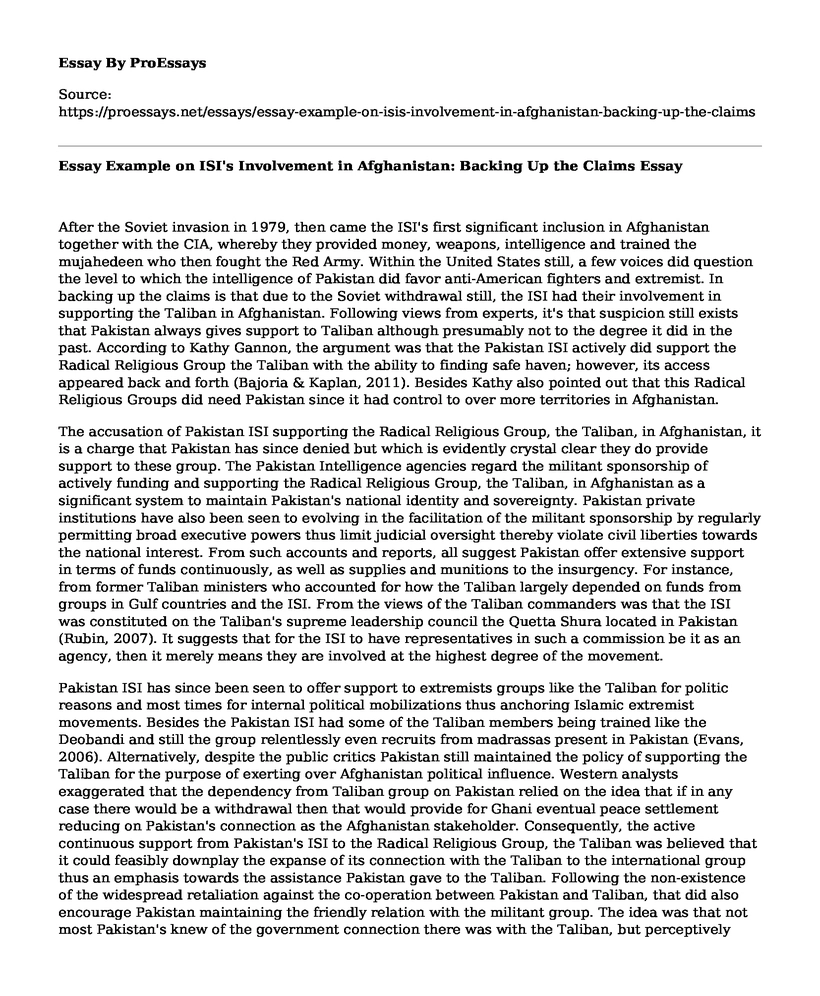After the Soviet invasion in 1979, then came the ISI's first significant inclusion in Afghanistan together with the CIA, whereby they provided money, weapons, intelligence and trained the mujahedeen who then fought the Red Army. Within the United States still, a few voices did question the level to which the intelligence of Pakistan did favor anti-American fighters and extremist. In backing up the claims is that due to the Soviet withdrawal still, the ISI had their involvement in supporting the Taliban in Afghanistan. Following views from experts, it's that suspicion still exists that Pakistan always gives support to Taliban although presumably not to the degree it did in the past. According to Kathy Gannon, the argument was that the Pakistan ISI actively did support the Radical Religious Group the Taliban with the ability to finding safe haven; however, its access appeared back and forth (Bajoria & Kaplan, 2011). Besides Kathy also pointed out that this Radical Religious Groups did need Pakistan since it had control to over more territories in Afghanistan.
The accusation of Pakistan ISI supporting the Radical Religious Group, the Taliban, in Afghanistan, it is a charge that Pakistan has since denied but which is evidently crystal clear they do provide support to these group. The Pakistan Intelligence agencies regard the militant sponsorship of actively funding and supporting the Radical Religious Group, the Taliban, in Afghanistan as a significant system to maintain Pakistan's national identity and sovereignty. Pakistan private institutions have also been seen to evolving in the facilitation of the militant sponsorship by regularly permitting broad executive powers thus limit judicial oversight thereby violate civil liberties towards the national interest. From such accounts and reports, all suggest Pakistan offer extensive support in terms of funds continuously, as well as supplies and munitions to the insurgency. For instance, from former Taliban ministers who accounted for how the Taliban largely depended on funds from groups in Gulf countries and the ISI. From the views of the Taliban commanders was that the ISI was constituted on the Taliban's supreme leadership council the Quetta Shura located in Pakistan (Rubin, 2007). It suggests that for the ISI to have representatives in such a commission be it as an agency, then it merely means they are involved at the highest degree of the movement.
Pakistan ISI has since been seen to offer support to extremists groups like the Taliban for politic reasons and most times for internal political mobilizations thus anchoring Islamic extremist movements. Besides the Pakistan ISI had some of the Taliban members being trained like the Deobandi and still the group relentlessly even recruits from madrassas present in Pakistan (Evans, 2006). Alternatively, despite the public critics Pakistan still maintained the policy of supporting the Taliban for the purpose of exerting over Afghanistan political influence. Western analysts exaggerated that the dependency from Taliban group on Pakistan relied on the idea that if in any case there would be a withdrawal then that would provide for Ghani eventual peace settlement reducing on Pakistan's connection as the Afghanistan stakeholder. Consequently, the active continuous support from Pakistan's ISI to the Radical Religious Group, the Taliban was believed that it could feasibly downplay the expanse of its connection with the Taliban to the international group thus an emphasis towards the assistance Pakistan gave to the Taliban. Following the non-existence of the widespread retaliation against the co-operation between Pakistan and Taliban, that did also encourage Pakistan maintaining the friendly relation with the militant group. The idea was that not most Pakistan's knew of the government connection there was with the Taliban, but perceptively Pakistan did not have control over the Taliban but got involved into the relationship of reciprocal deceit for both sides to advance on their interests as they exploit each other.
Conclusion
Pakistan's ISI is the premier intelligence agency whose operations around the world have seen to actively fund and support the Radical Religious Group, the Taliban, in Afghanistan. It follows several accounts of interviews that have posed the allegations thereby creating intense pressures for Pakistan to scale back its relations with the Taliban. The continuous support by the Pakistan ISI was to maintain the Taliban policy of Pakistan advancing their interest which is the national interests and also deploying political influence over Afghanistan.
References
Akhtar, N. (2008). Pakistan, Afghanistan, and the Taliban. International Journal on World Peace, 49-73.
Bajoria, J., & Kaplan, E. (2011). The ISI and terrorism: Behind the accusations. Council on Foreign Relations, 4.Bajoria, J., & Laub, Z. (2011). The Taliban in Afghanistan. Council on Foreign Relations, 6.Evans, A. (2006). Understanding madrasahs: How threatening are they?. Foreign Affairs, 9-16.
Gregory, S. (2007). The ISI and the War on Terrorism. Studies in Conflict & Terrorism, 30(12), 1013-1031.
Roy, O. (2002). Islamic radicalism in Afghanistan and Pakistan. UNHCR.Rubin, B. R. (2007). Saving Afghanistan. Foreign Aff., 86, 57.
Winchell, S. P. (2003). Pakistan's ISI: The invisible government. International Journal of Intelligence and Counterintelligence, 16(3), 374-388.
Cite this page
Essay Example on ISI's Involvement in Afghanistan: Backing Up the Claims. (2023, Jan 11). Retrieved from https://proessays.net/essays/essay-example-on-isis-involvement-in-afghanistan-backing-up-the-claims
If you are the original author of this essay and no longer wish to have it published on the ProEssays website, please click below to request its removal:
- Monroe Doctrine
- Article Review Example. Reconstruction: America's Unfinished Revolution, 1863-1877
- Implementation of International Humanitarian Law - Exploratory Essay
- Essay on the Tragic Death of Princess Diana: A Conspiracy Theory
- Safe Medical Devices Act of 1990: A Milestone in US History - Essay Sample
- Free Paper Sample on Understanding HIV Prevalence in Botswana: Essential for Prevention Measures
- The Athenian Renaissance: From Ancient to Present Civilization - Essay Sample







